June 4, 2025 | 17:10 GMT +7
June 4, 2025 | 17:10 GMT +7
Hotline: 0913.378.918
June 4, 2025 | 17:10 GMT +7
Hotline: 0913.378.918
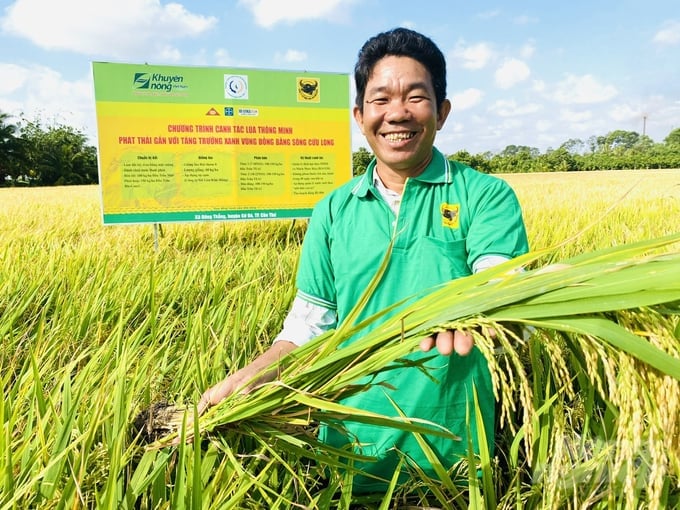
The "Smart rice farming model in association with low emission and green growth in the Mekong Delta region", as presented at Mr. Le Thanh Tung's household in Thoi Hiep 2 hamlet, Dong Thang commune, Co Do district, Can Tho city. Photo: Le Hoang Vu.
Can Tho Agricultural Service Center, in collaboration with Binh Dien Fertilizer Joint Stock Company, Saigon Kim Hong Company, Bayer Vietnam Company, and VinaRice Company, implemented the demonstration model for "Smart rice farming in association with low emission and green growth in the Mekong Delta region" at Mr. Le Thanh Tung's household in Thoi Hiep 2 hamlet, Dong Thang commune, Co Do district, Can Tho city. The demonstration model covers an area of 3.2 hectares during the 2023-2024 winter-spring rice crop, including 1.2 hectares of dedicated smart rice farming area. The remaining 2 hectares are used for traditional rice farming as control fields.
According to Mr. Le Thanh Tung, he pumped water into the fields to bury straw into the soil following the harvest for the 2023 winter rice crop. Subsequently, he flooded the fields for over two months to decompose the straw and return nutrients to the soil, in addition to eliminating pests.
Ten days prior to sowing, Mr. Tung reduced the water level to clean the fields, repair embankments, drill water supply channels, and eliminate snails and rodents. Two days prior to sowing, he conducted a basal application of Dau Trau saline-sulphate fertilizer. Prior to sowing, the fields were relatively leveled with multiple large water channels and well-formed ridges to prevent the formation of puddles, which can potentially damage the seedlings.
The rice variety used in the model is a certified high-quality variety provided by VinaRice Company, which is suitable for both the local seed structure and export demand. A cluster seeding machine provided by Saigon Kim Hong Trading and Service Limited Company is employed during the seeding process to reduce the amount of seeds required compared to traditional practices (from 120 - 180 kilograms per hectare to 40 - 60 kilograms per hectare). Subsequently, the basal application of Dau Trau saline-sulphate fertilizer is conducted at the beginning of the crop. Additionally, specialized fertilizers are used on rice in accordance with the formula provided by Binh Dien Fertilizer Joint Stock Company to increase rice production efficiency.
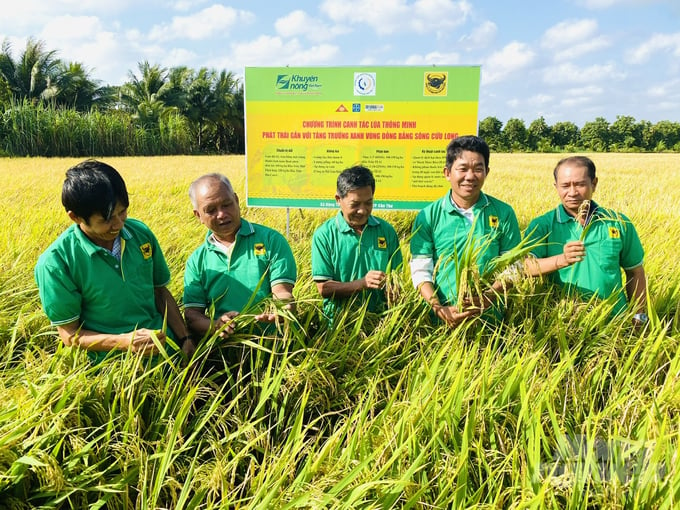
During the 2023-2024 crop, four major businesses jointly implemented the first iteration of the smart rice farming model in the Mekong Delta region. Photo: Le Hoang Vu.
Furthermore, the model incorporates a comprehensive set of production techniques and integrated pest management (IPM) measures to reduce the use of plant protection products, and manage pests according to the Much More Rice solution process provided by Bayer Vietnam. The alternation between wet and dry irrigation techniques to conserve water were implemented in conjunction with other synchronized techniques.
Based on the production result evaluation, the smart rice farming model achieved a yield of 9 tons per hectare, and a profit of over 52 million Vietnamese dong per hectare. On the other hand, the control fields achieved a yield of 8.23 tons per hectare and a profit of over 41 million Vietnamese dong per hectare. As a result, the model helped farmers reduce costs, increase yields, and significantly boost profits compared to the that of the control fields.
Mr. Nguyen Thanh Hung, Director of Can Tho Agricultural Service Center, stated that the model for "Smart rice farming in association with low emission and green growth in the Mekong Delta region" aims to introduce advanced farming solutions and techniques which are suitable for the current ecological conditions of local rice fields. In order to reduce seed usage, minimize the use of fertilizers and plant protection products, irrigation water, and reduce losses during harvesting, farmers must utilize mechanization throughout the entire production process, from seed selection to harvesting and storage.
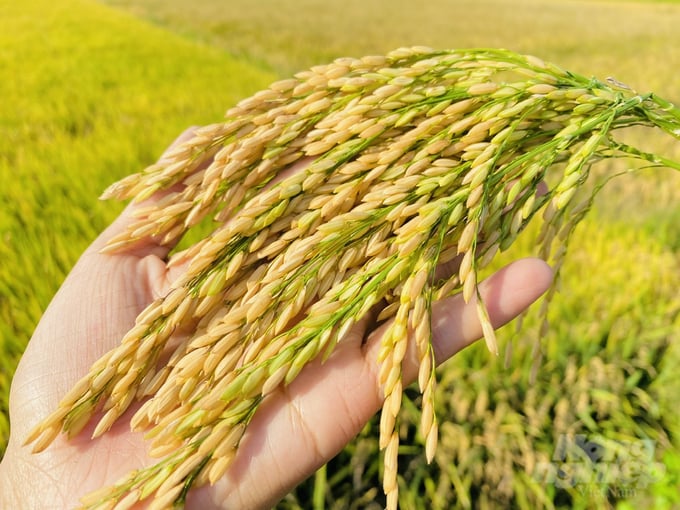
Smart rice farming helps reduce costs and improve rice quality. Photo: Le Hoang Vu.
Notably, the smart rice farming model implemented in Dong Thang commune, Co Do district, Can Tho city has an investment cost of only 18.5 million Vietnamese dong per hectare. The significant cost reduction is attributed to the reduction in seed usage, fertilizer expenses, and plant protection product costs. On the other hand, the yield of the smart rice farming model, using Binh Dien's basal and specialized fertilizers, reached 9 tons per hectare, which is 0.77 tons per hectare higher than that of fields outside the model, resulting in an additional profit of 6 million Vietnamese dong per hectare.
Mechanization, particularly the use of cluster seeding machines provided by Saigon Kim Hong Company, has enabled farmers to reduce seed usage to only 50 to 60 kilograms per hectare (compared to 150 to 160 kilograms per hectare outside the model). Cluster seeding helps reinforce the rice plants, and boost their resistance to lodging, pests and diseases, thereby increasing productivity, reducing fertilizer usage, and enhancing photosynthesis during the growing, flowering, and ripening stages. Consequently, the resulting rice plants will provide high efficiency and profit. This model has proven the effectiveness of cluster seeding, indicating the necessity for future development of the technique.
The implementation of the pest management technique as provided by Bayer Vietnam's Much More Rice program has reduced pesticide usage, thereby lowering plant protection product costs in rice farming, promoting natural enemies, and reducing environmental pollution.
According to the demonstration model, specialized fertilizer such as Dau Trau is supplemented with additional micronutrients (CaO, SiO2, Zn, etc.) to boost the rice plants' resistance to pests, diseases, and adverse weather conditions. The basal application of Dau Trau saline-sulphate fertilizer stimulates the soil's microorganism system, subsequently improving the rice plants' capacity to absorb nutrients from the soil.
With the aim of further expanding the smart rice farming model in association with low emission and green growth in the Mekong Delta region and increasing the participation of rice farmers, Mr. Nguyen Thanh Hung, Director of the Can Tho Agricultural Service Center, suggested Binh Dien Fertilizer Joint Stock Company to continue supporting the construction and implementation of more demonstration models in the future. Additionally, the application of fertilizer formulas based on different growing seasons and regions will further optimize fertilizer usage. Moreover, it is necessary to facilitate farmers' visits, education, and practical application in production.
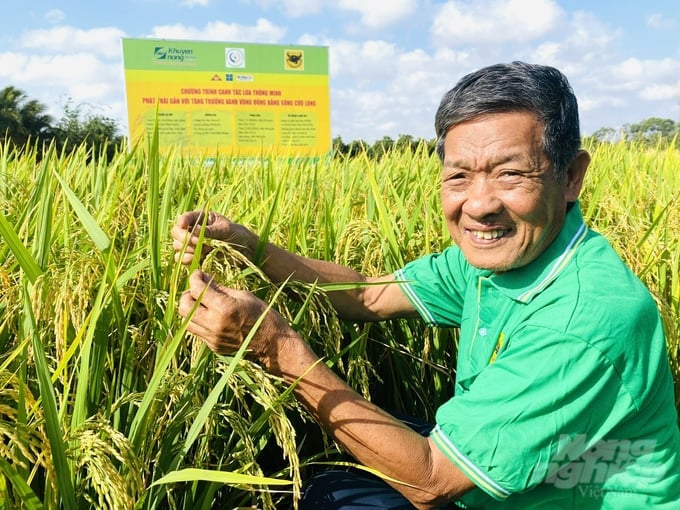
Based on the production result evaluation, the smart rice farming model achieved a yield of 9 tons per hectare, and a profit of over 52 million Vietnamese dong per hectare. On the other hand, the control fields achieved a yield of 8.23 tons per hectare and a profit of over 41 million Vietnamese dong per hectare. Photo: Le Hoang Vu.
The employment of cluster seeding machines provided by Saigon Kim Hong Trading and Service Limited Company is an advanced technique that brings high efficiency. Consequently, it should be encouraged and expanded in production to gradually replace the traditional broadcasting method. The company needs to continue accompanying Can Tho farmers in implementing cluster seeding models in the future.
Bayer Vietnam Company will continue to accompany Can Tho farmers in implementing models using the Much More Rice solution, with the aim of covering various other crops in the future.
VinaRice Company will also continue to accompany the smart rice farming program in the future. The company will continue to support and provide high-quality seeds that meet both domestic consumption and export criteria.
Rice production in the Mekong Delta region is facing significant challenges in terms of drought, saltwater intrusion, pest pressure, rising fertilizer prices and input costs. As a result, farmers require farming solutions as well as access to suitable technical advancements based on the current ecological conditions of rice fields.
Namely, farmers should be encouraged to utilize mechanization throughout the production process, and reduce the usage of seed, fertilizer, plant protection product, and irrigation water. Consequently, profits will rise whereas the total costs associated with rice production will decrease.
Translated by Nguyen Hai Long
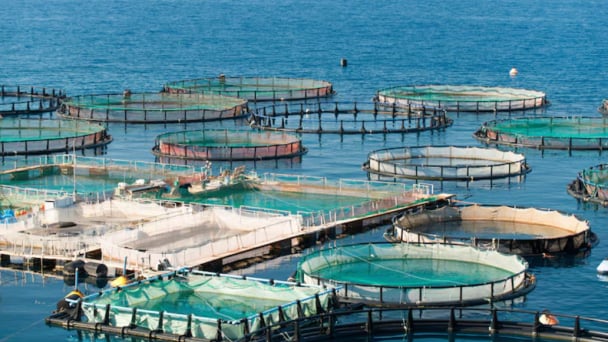
(VAN) Technology is redrawing the map of Vietnamese aquaculture: more modern, greener, and more sustainable.

(VAN) Novel process harnesses machine learning to reveal groups of genes that determine how efficiently plants use nitrogen.

(VAN) Several scientists and farmers are experimenting with soil treatment in some key durian-growing regions such as Cai Lay (Tien Giang), Dak Song, Gia Nghia, and Dak R’lap (Dak Nong).
/2025/05/25/4127-3-073637_820.jpg)
(VAN) Thanks to the promotion from an FAO-implemented project, vegetable production in greenhouses in Moc Chau has seen strong development, from 1.5 hectares in 2021 to nearly 50 hectares in 2024.

(VAN) FAO has recently supported USD 140,000 to implement the project 'Risk mitigation human-animal interface risks through disease control initiatives in pig farming.'

(VAN) The People's Committee of Tra Vinh province has approved an adjustment to the investment policy for the Green Hydrogen Plant project, increasing its area to approximately 52.76 hectares.
![Reducing emissions from rice fields: [2] Farmers’ commitment to the soil](https://t.ex-cdn.com/nongnghiepmoitruong.vn/608w/files/news/2025/05/05/dsc08881jpg-nongnghiep-140632.jpg)
(VAN) Clean rice cultivation model in Thuong Tan commune, Bac Tan Uyen district, is assisting local residents in achieving sustainable agriculture by substantially reducing costs, increasing productivity, and protecting the environment.